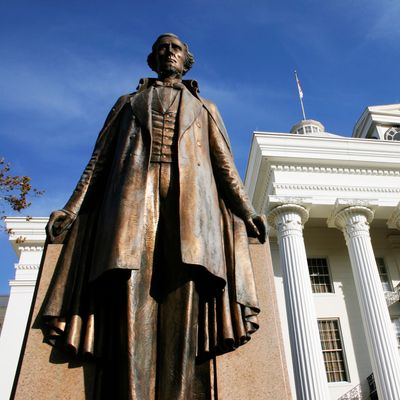
Alabama’s recent (and overwhelming) enactment of the nation’s most reactionary abortion law — a law that embarrassed many Republicans nationally and even occasioned a dissent from its terms by Donald Trump — probably made some Americans who don’t regard the state as their sweet home wonder if the self-described Heart of Dixie might profess some values a bit out of the mainstream.
Wonder no more. AL.com confirms:
Jefferson Davis — the president of the Confederate states from 1861-1865 — was born on June 3, 1808. Alabama marks that occasion every year with an official state holiday …
The Davis holiday is one of three in Alabama that honors Confederate leaders: Robert E. Lee’s birthday, which is marked in January on the same day as Martin Luther King Day; Confederate Memorial Day in April; and Davis’ birthday in June …
Alabama is the last state to have a legal holiday set aside solely to commemorate the birth of Davis. Mississippi marks Davis’ birthday but includes it in the Memorial Day celebration. In Texas, Davis’ birthday is part of “Confederate Heroes Day” while other Southern states, including Florida, Kentucky and Tennessee, have a holiday for Davis on the books but do not give employees a day off.
That’s right: Even Davis’s home state of Mississippi, which he represented in Congress and where he died in 1889, no longer shuts down state government to honor the arch-traitor. But Alabama does.
As a Georgia state employee a generation ago, I can remember the trouble I took to arrange my schedule such that I was working at home or on the road on what was then a Davis holiday in my own state, embarrassed to let Yankee friends or work colleagues know about it. It was a shameful and retrograde commemoration then, and certainly still is. Unlike his traitor-in-arms Robert E. Lee, Davis can’t be defended with the sort of weak rationalizations available to protect the legacy of the Lost Cause. Davis was by no means a military genius or a symbol of postwar reconciliation or some sort of icon of southern chivalry. He was a bigot who was convinced that civilization itself depended on the enslavement of African-Americans, as illustrated by this very typical quote unearthed by Ta-Nehisi Coates:
[A]mong us, white men have an equality resulting from a presence of a lower caste, which cannot exist where white men fill the position here occupied by the servile race. The mechanic who comes among us, employing the less intellectual labor of the African, takes the position which only a master-workman occupies where all the mechanics are white, and therefore it is that our mechanics hold their position of absolute equality among us.
Confederate president Davis made white supremacy the unmistakeable cornerstone of his criminal enterprise, as James W. Loewen observes:
White supremacy was Confederate national policy from the top down. In November, 1862, for example, Confederates seized four African Americans in U.S. uniforms on a South Carolina island and asked Richmond what to do with them. President Davis and his secretary of war approved their “summary execution,” which was and is a war crime. When President Lincoln released the Emancipation Proclamation on January 1, 1863, Jefferson Davis called it “the most execrable measure recorded in the history of guilty man.” He proposed to his Congress that white officers of black troops be delivered to state authorities to be “dealt with in accordance with the laws … providing for the punishment of criminals engaged in exciting servile insurrection” — again, execution. The Confederate Congress responded that the C.S.A. should use its own military courts to have such persons “put to death or be otherwise punished.”
The Confederacy put these policies into practice. Time after time, at Fort Pillow, Tennessee; Poison Spring, Arkansas; Brice’s Cross Roads, Mississippi; Olustee, Florida, etc., Confederate troops killed black POWs and their officers. On the home front, in February, 1863, Davis decreed the enslavement of “all free Negroes in the Southern Confederacy.”
After the war, Davis was imprisoned but escaped trial for treason thanks to a tragicomedy of errors committed by Andrew Johnson’s administration. Unsurprisingly, he was a bitter opponent of the Reconstruction of his region, and defended the Confederacy even when mild repentance might have won his clemency:
An amnesty bill that restored citizenship to Confederate leaders in 1876 specifically excluded Davis, and the former Confederate president did not fight the decision. “It has been said that I should apply to the United States for a pardon. But repentance must precede the right of pardon, and I have not repented,” Davis told the Mississippi Legislature in 1884, before adding, “If it were all to do over again, I would again do just as I did in 1861.”
Jimmy Carter, the first post–Civil War president from the Deep South, signed a pardon in 1978 posthumously restoring citizenship rights to Davis in what was likely an effort to secure political cover for his controversial amnesty for Vietnam War draft evaders. Even if his desire for letting bygones be bygones was understandable, honoring Davis as a hero, as Alabama still does, is just wrong.
But the idea that celebrating racism is an innocent recognition of “heritage” lives on, as reflected by the attitude of Alabama’s governor, who also recently signed that abortion bill:
In 2017 … Alabama enacted the Alabama Memorial Preservation Act, which prohibits local governments from removing, altering or renaming monuments more than 40 years old.
The state’s attorney general in August 2017 used that law to sue the majority-black city of Birmingham for covering a Confederate monument with plywood and a tarp. Gov. Kay Ivey has called efforts to remove Confederate symbols “politically correct nonsense.”
So, too, presumably, is respect for the African-American citizens Jefferson Davis considered suitable only for slavery.






























